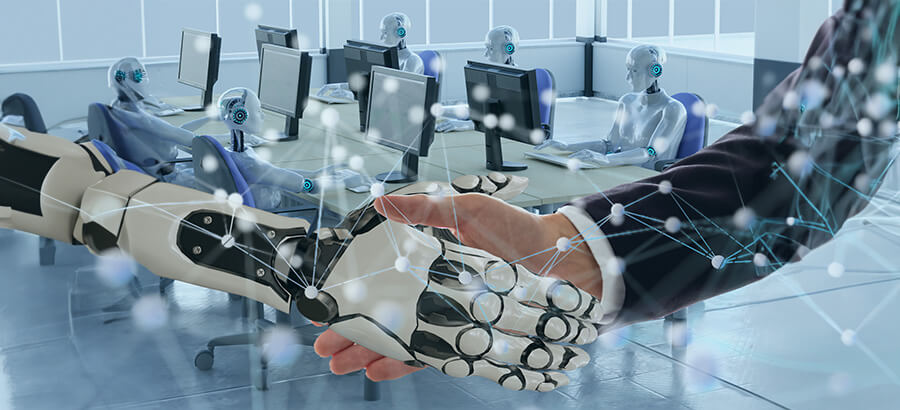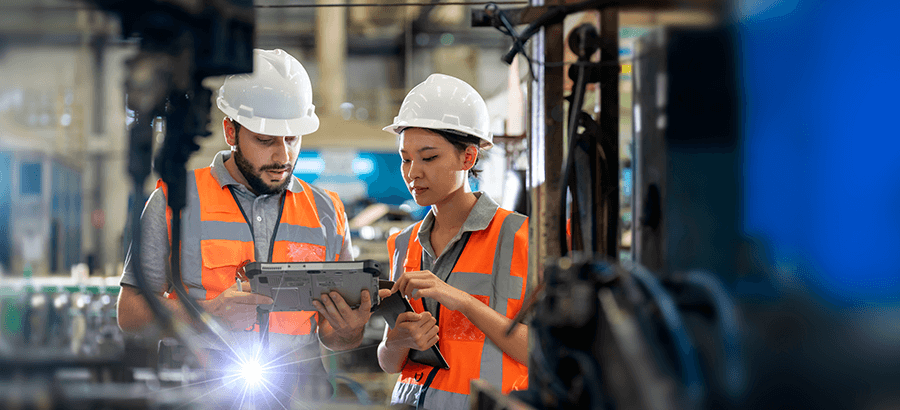This time last year artificial intelligence (AI) was an obscure, mainly academic, technology to most of us. In the last few months, however, there has been an avalanche of stories and articles about amazingly powerful AI tools that use everyday language. The potential and challenges of generative AI are upon us.
The new AI revolution presents a great opportunity for manufacturers to retain their staff and attract younger employees by providing new skills for the future world of business where the role of AI will play a greater part.
The impact of AI on manufacturing is that the skills used will be more advanced. People will need to learn to do more complex tasks which will fundamentally change lives, including creating better jobs. Manufacturers should be aware of how AI will affect them and the skills strategies they will need to create. They also need to plan how they should adapt the organisation to use AI in a responsible and well governed manner
What is AI?
AI is a term for computing capabilities that are perceived as representing intelligence, including image and video recognition, prescriptive modelling, smart automation, advanced simulation, and complex analytics. In the context of manufacturing processes, AI revolves around the following technologies:
- Machine learning: Using algorithms and data to automatically detect patterns without being explicitly programmed to do so.
- Deep learning: A subset of machine learning that uses neural networks to identify objects like images and videos.
New technology and the jobs outlook
The World Economic Forum’s Future of Jobs report notes that companies expect to re-structure their workforce in response to new technologies. This will include a reduction in jobs through automation, as well as adding new jobs.
How jobs will change due to technology (source WEF)
| Companies that will reduce the workforce | 43% |
| Companies that will expand the workforce | 34% |
| Jobs lost due to technology by 2025 | 85 million |
| Jobs added due to technology by 2025 | 97 million |
The biggest limit to companies harnessing the growth potential of new technologies will be the skills shortage. To combat this, the WEF reports that by 2025 companies will on average provide access to reskilling and upskilling to 73% of their workforce. For 40% of the workforce, this will require less than six months to reskill.
The impact of AI on manufacturing
Many functions and processes will be affected by the adoption of AI in manufacturing. This will include, among others, AI tools that:
- handle a high volume of repetitive tasks, transferring data across systems, doing queries and calculations, and automating functions such as order processing;
- perform predictive maintenance by analyzing vast amounts of sensor data to predict equipment failures so that manufacturers can schedule maintenance proactively, reducing downtime and optimizing production efficiency;
- detect defects and anomalies in real-time using computer vision and machine learning to improve quality control;
- analyze complex supply chain data, including demand forecasting, and inventory management, to identify bottlenecks and optimize the supply chain;
- mimic the design process used by engineers to produce hundreds of design options for a single product;
- automate monotonous operations in factories using robots to eliminate or decrease human error, and focus human workers’ attention on more value adding parts of the business.
How manufacturing skills will change due to AI
Manufacturers should realize that building skills is integral to their AI strategy. This will involve change management to ensure that AI technology is accepted and understood by staff and is used effectively, ensuring that the business gains from the technology investment.
In AI-driven manufacturing, several new skills will be in demand. Tomorrow’s manufacturing worker will need to be ready to work with a new toolset. A key skill will be critical thinking to grasp and solve complex problems, like evaluating the pros and cons of an option. AI technology can accomplish many things, but it still cannot think like a real human.
New skills will involve:
- creating and managing shop floor-level implementations of automation and AI;
- continually learning to use new tools;
- deriving actionable insights from data that comes from AI systems;
- developing, training, and fine-tuning AI models for specific manufacturing processes;
- applying established manufacturing principles and methodologies to AI-generated data to improve processes and enhance productivity;
- working ‘smarter’ by augmenting existing skills and abilities with AI assistance;
- implementing and maintaining the on-premise and cloud-based technologies required for an integrated shop floor;
- understanding how AI can impact the wider eco-system in supporting the integration and optimization of the entire supply chain.
Another key skill will be how to work together with other employees to solve problems jointly, overcome differences and create stronger working relationships. Collaboration is still the secret sauce for creating a place where people want to work.
With manufacturing workplaces increasingly relying on ERP systems and AI applications, manufacturing jobs will require computer skills. For example, production planners will be using AI-powered scheduling and manufacturing operations systems to optimize efficiency, respond quickly to changing customer demands, and make better decisions about work in the factory.
The need to upgrade skills in manufacturing
Just about every job in manufacturing that requires creativity or working with information is likely to be affected in some way by AI. However, AI is a just tool and its impact will depend on how it is used. Those who learn to harness its potential are those who are likely to benefit. Many traditional skills will still be valuable when combined with AI-related skills and a willingness to adapt to a new way of working.
While AI is going to help with some current challenges, it will also present new problems. To solve these is going to need new people as well as developing new skills and knowledge in existing staff. With a skills gap plaguing manufacturing in many countries, companies should invest in upskilling their current workforce as they adapt to new technologies. Furthermore, by promoting how they use technology, manufacturers have the opportunity to attract a generation that currently is not interested in the sector, namely millennials.
AI is transforming the manufacturing industry, and workers will need to adapt to these changes by acquiring new skills.







